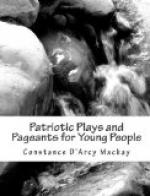PAGEANT DIRECTIONS
Care should be taken in choosing the pageant site. The actual stage should be a level sward, with close-clipped grass that will make it as easy as possible for the dancers. It is ideal if the background and sides of this stage can be picturesquely wooded, and present a vista through which the pageant players can be seen approaching. It will be well if the pageant stage itself has a tree or so. This stage should vary in size according to the number of people in the cast. A small cast requires a smaller and more intimate stage. In this way scenes in which a crowd of supernumeraries are needed will give the effect of having more people than are actually there. On the other hand, a large stage is needed for big effects, where a great number of people are used. Too small a stage makes a great number of players seem a huddled mass, and through this pantomimic effects are lost.
The pageant players should, if possible, have the sun at the side. It is very difficult to play facing a strong light. Choice of the time of day in which the pageant is given has much to do with its effectiveness. Late afternoon (from four o’clock on) is by far the best time for outdoor drama. The earlier hours are somewhat garish,—the light too high, the contrasts too sharp and unvaried. But from four o’clock on the light mellows, the shadows become long and sweeping, the outdoor effects grow more and more beautiful. It is as if the first hint of sunset were the signal for ringing down a magic curtain on a scene where nature herself was pageant mistress. This is true of all outdoor plays as well as pageants.
Those who direct the pageant should see to it that the youthful players make a finished exit; that is, that one scene and set of players disappear entirely from view before another set of players begin to come on. Off stage the players should be in groups, arranged in the order in which they are to appear, so that as one group leaves the stage, the next is ready to appear, and confusion is avoided. No talk should be allowed off stage. On a still Summer day sounds carry: a murmur is confusing to the players.
The players should not be dependent on words alone for their cues. Very often a word may fail to carry out of doors; but a gesture can always be seen. Therefore, gesture cues can be used at many of the climaxes. These cues can be quite simple and natural, and while perfectly understandable to the players themselves, need not be at all obvious to the audience. The players and their director can decide upon the cues, and will find them of immense help. Thus, by an upraised arm, or by tossing back a braid of her hair, Pocahontas can signal to Powhatan that her talk with John Smith is finished. Washington shielding his eyes with his hand can be a signal to Carey that it is time for him to enter, etc., etc. Of course, in many cases the ending or beginning of a dance, or the entrance of some principal character will be cue enough in itself.




